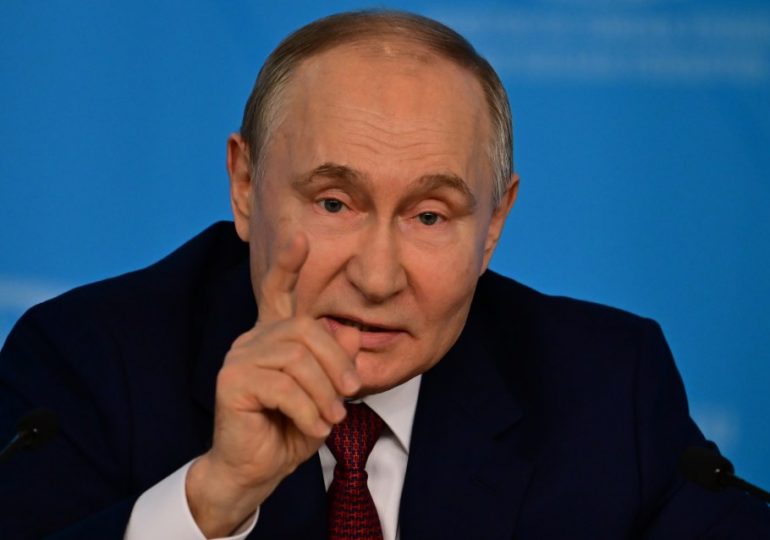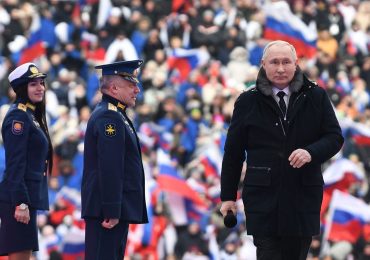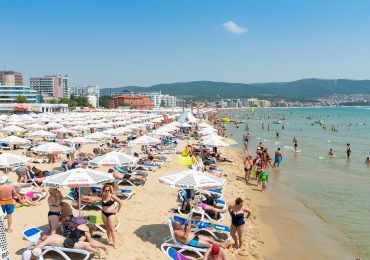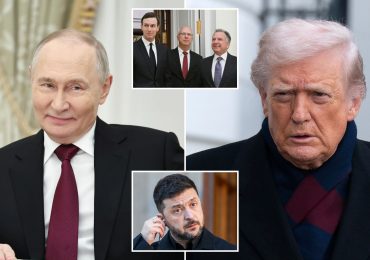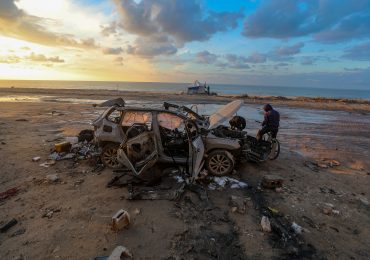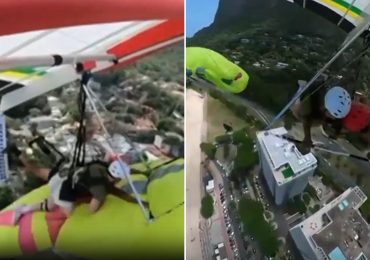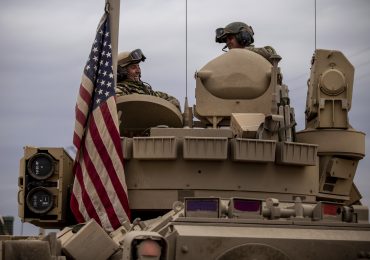VLADIMIR Putin claims he is ready to negotiate with Ukraine as soon as “tomorrow” after the G7 pledged $50billion for the war-torn country.
The Russian tyrant also vowed to punish the West for pushing him towards “the point of no return” as leaders signed new security pacts with Kyiv.
GettyVladimir Putin raged against the West and said the world has reached the ‘point of no return’ as he laid out his ceasefire terms[/caption]
EPAUS President Joe Biden signed a 10-year security agreement with Ukrainian president Voloydmyr Zelensky on Thursday[/caption]
Twitter / @RNCResearchEmmanuel Macron, Rishi Sunak, Joe Biden and Giorgia Meloni at the opening day of the G7 summit[/caption]
In seething remarks following the opening day of the G7 annual summit, Putin boasted Moscow “possesses the largest arsenal of nuclear weapons” and blamed the West for the collapse of global security.
In an address to Russia’s Foreign Ministry on Friday, he said that the world “has come unacceptably close to the point of no return”.
The raging despot accused Western leaders of “extreme recklessness” and claimed they do not know “the scale of the threat they are creating”.
In a thinly veiled threat of nuclear war, Putin, 71, warned they were spiralling towards a path of great “tragedy”.
His biting remarks were quickly followed up with the announcement he was ready to “sit down at the negotiation table on Ukraine” as soon as “tomorrow”.
Yet, his inordinate conditions for doing so are for Kyiv’s troops to surrender the Ukrainian regions of Zaporizhzhia, Kherson, Donetsk and Luhansk.
He also demanded Ukraine give up its plans to join Nato in order to turn over a “tragic page of history”.
If Ukraine agreed to those conditions, Putin said Russia would enact a ceasefire and immediately start negotiations.
It is a “concrete, real peace proposal,” Putin said.
“If Kyiv and the Western capitals also refuse it, as before, then in the end it is their business and their political and moral responsibility to continue the bloodshed.”
“We are not talking about freezing the conflict, but about bringing it to a definitive end,” he added.
His ceasefire terms came in response to new, long-term security commitments from the Group of Seven major democracies, which includes the UK, US, Canada, France, Germany, Italy and Japan.
However, the centrepiece of the opening day in Apulia, Italy was an agreement to lock up sanctioned Russian assets until Moscow pays reparations for invading Ukraine.
It paved the way for G7 leaders to announce a $50billion loan leveraged from the interest of more than $260billion (£204bn) in frozen Russian assets, largely held in Europe.
The details of the provisional plan – which Putin today blasted as “theft” and promised would “not go unpunished” – will be finalised in coming weeks.
AFPZelensky and Biden signed pacts designed to send a message to Putin that ‘you cannot divide us’[/caption]
What details do we know about the G7-Ukraine deal?
By Iona Cleave
ON the opening day of the annual G7 summit, the focus remained on Ukrainian security as leaders pledged to support Kyiv to the end – a vow worth $50billion.
The world leaders agreed to lend Ukraine the billions using profits from Russia’s frozen assets. But how will it work?
The money would be backed by profits being earned on roughly $260 billion in immobilised Russian assets confiscated since Moscow invaded Ukraine in February 2022.
The bulk of the cash – which still belong to Russia but cannot be accessed by Moscow – is tried up in EU countries.
A French official said the loan could be “topped up” with European money or contributions from other countries.
The aggressive plan – the details of which are still be hashed out on the sidelines – could see the money reach Ukraine by the end of 2024.
The aim of the deal is to ensure it can run for years regardless of who is in power in each G7 state – a nod to concerns that Donald Trump may be much less sympathetic to Kyiv if he beats Biden in November’s election.
President Biden said the move was part of a “historic agreement.”
Ukrainian president, Volodymyr Zelensky, said providing a loan through Russia’s assets “is a vital step forward in providing sustainable support for Ukraine in winning this war.”
German Chancellor Olaf Scholz. said he hoped the new commitment would “embolden the Ukrainians to do what they need to to defend their independence and sovereignty.”
SECURITY PACTS
For the second successive year, President Voloydymr Zelensky attended the talks which proved immensely fruitful for the embattled leader.
On Thursday, Biden and Zelensky signed a 10-year security agreement which they jointly hailed as a message to Putin of unified opposition.
Zelensky said the deal showed the “credibility of American support for our Ukrainian independence.”.
The pact is aimed at bolstering Ukraine’s defence against Russian invaders and getting Ukraine closer to Nato membership.
But the timing is also key.
It aims to commit future US administrations to support Ukraine, even if former President Donald Trump wins November’s election, US sources revealed.
“Our goal is to strengthen Ukraine’s credible defense and deterrence capabilities for the long term,” Biden declared.
Zelensky also signed a 10-year security accord with Japan, with Tokyo promising to provide Kyiv with $4.5billion ($3.5bn) this year – underlining its commitment to Ukraine.
The cash is expected to reach Kyiv by the end of the year.
US President Joe Biden and Zelensky also signed a 10-year bilateral security agreement on Thursday to remind Putin “we’re not backing down.”
“You cannot wait us out. You cannot divide us,” Biden said.
Ukraine has been eager for fresh assistance to hold the line against Russia, which has recently made gains on the battlefield during a bloody war that rages deeper into its third year.
It comes as a Nato official warned that Moscow’s forces suffered “astronomical” losses during their starting weeks of its Kharkiv offensive.
“Russia likely suffered losses of almost 1,000 people a day in May, which is quite an astronomical figure,” the unnamed official told Pravda.
He added that Russia has failed to create a buffer zone, despite Putin’s claims, and the territories controlled by Russia are fragmented.
“Therefore, in the long run, Russia’s victories in this area will be limited,” the official added.
GettyCash-strapped Kyiv is in desperate need of further weapons and support from its allies[/caption]
ReutersThe $50billion raised from the profits of frozen Russian assets is expected to reach Kyiv at the end of this year[/caption]
ReutersThe new security agreement between US and Ukraine is designed to withstand successive US administrations[/caption]
ReutersUkraine was the focus of the G7 annual summit in Italy this week[/caption]
Leave a comment
